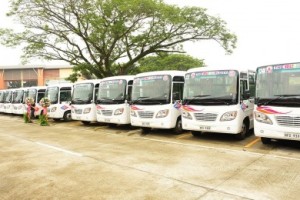DAVAO DEL NORTE (PIA) -- The Land Transportation Franchising and Regulatory Board (LTFRB) officials in Davao Region have assured stakeholders and public transport commuters of high-end public transport services with the full implementation of the Public Utility Vehicle Modernization Program (PUVMP).
As guests of the Philippine Information Agency-Davao del Norte’s Sayron Ta! Pakigsayod: Serbisyo Alang sa Katawhang Pilipino radio program, both LTFRB legal officer and OIC chief transportation development officer Ernest Benz S. Davila and LTFRB XI PUVMP Program head Ronnel Victor N. Panigon discussed how the public would enjoy the comfortable, accessible, sustainable, and safe “CASA'' experience when riding in PUVs.
Davila cited such an objective as aligned with the mandate of LTFRB, and “this can be achieved through the transport modernization program,” which, he said, rolls out air-conditioned PUVs equipped with global positioning systems (GPS), closed-circuit television (CCTV), and wireless networking technology, or WiFi.
According to Davila, the modernized PUVs are also environment-friendly as they are mechanically designed with the so-called “Euro 4 diesel engine” that filters out contaminants, thereby reducing the risk of mechanical damage.

With these modern technology features of the modernized PUVs, Davila assured the public of the comfort and safety of commuters.
“Hindi na tayo tatanungin kung mahangin ba sa labas. (We would no longer be asked if it was windy outside),” he said, referring to the untouched hairdo and unspoiled attire of dressed-up commuters.
Behind the “casa '' type of services that modernized PUVs offer are the well-assisted transport industry consolidators who are given social support and financial assistance by national line agencies (NGAs) which are made part of the PUVMP implementation, said Panigon.
“If they choose to avail of the modernized units, naay subsidy nga ginahatag sa mga transport coops (there is a subsidy given to transport coops) to acquire the modernized units,” he added.
He explained that the consolidated transport coops or corporations can avail of loan subsidies either from the Development Bank of the Philippines (DBP), Land Bank of the Philippines (LBP), or private financial institutions.
For purchases of Class 1 modernized PUVs, a P210,000 subsidy can be availed per unit, and for those classified as Class 2, 3, and 4, a separate P280,000 per unit can be availed from the government financial institutions.
“If they choose to avail from private banks and coop banks, P210,000 for Class 1 and P360,000 for Class 2, 3, and 4 per unit,” Panigon explained, adding that the subsidies would directly be deducted from the unit price of each unit of vehicle.
As a co-implementer of PUVMP, the Department of Transportation (DOTr) has explained in its social media page that under Class 1, there are 9–12-seater PUVs that will be deployed to serve “narrow barangay, municipal, or provincial roads.”
The Class 2 and 3 with a maximum 23-passenger seating capacity “are the current ones we are seeing as jeepney replacements, except in seating arrangements where Class 2 has the regular jeepney seating capacity but with a ceiling height that will let average Filipinos stand in the middle.”
DOTr specifically said that the Class 3 modernized PUVs “are front-facing variants, which are the required replacement for all UV express.”

Aside from the GFIs, the Technical Education Skills and Development Authority provides the skills training needs of the spouses and the children of PUV drivers for them to get employed in the consolidated transport entities.
Other cooperating NGAs are the Department of Trade and Industry, Department of Tourism, Department of Budget and Management, Land Transportation Office, and Securities and Exchange Commission, among others. (JMDA/PIA Davao del Norte/Thumbnail photo from PNA)



